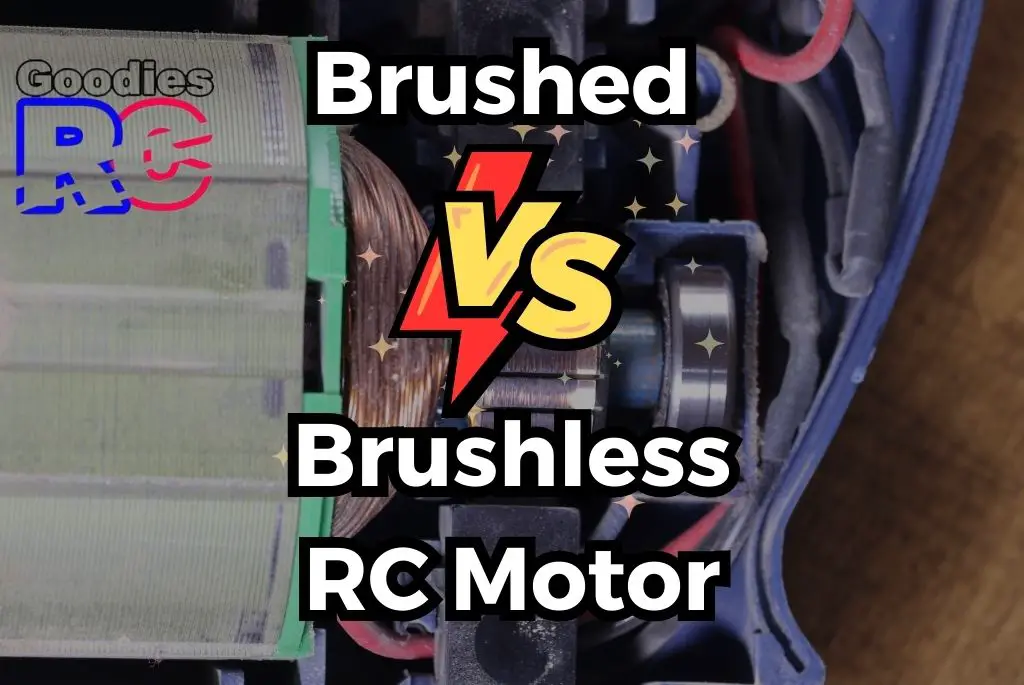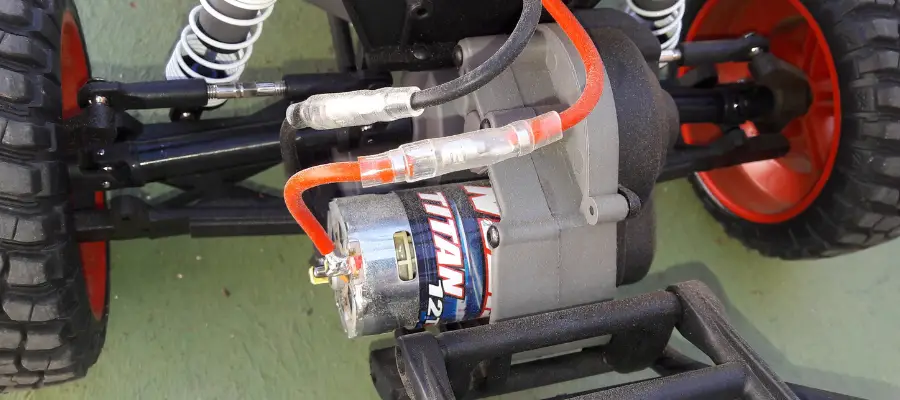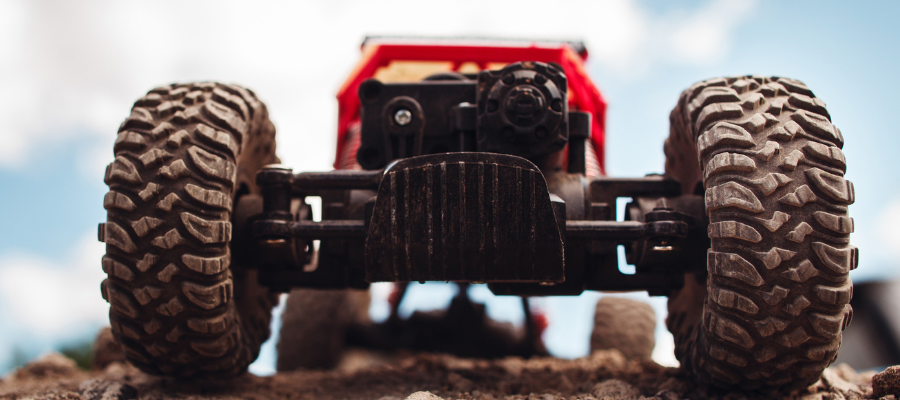For radio-controlled RC cars, the choice of the motor plays a crucial role in their performance and overall driving experience. The two main types of motors for RC vehicles are brushed and brushless motors.
Brushed motors have brushes and a commutator for electrical contact. Brushless motors use electronic commutation. Brushed motors are less efficient, require maintenance, and have lower power. Brushless motors are more efficient, and durable, and provide higher performance.

But that’s just some of the major differences, each motor type has its own set of characteristics, advantages, and disadvantages. I’ll highlight their key features, performance factors, and the benefits they offer. Let’s start with the fundamental concepts of each motor.
Understanding Brushed Motors
A brushed motor is an older type of electric motor used in most toy-grade or cheaper RC vehicles. They comprise a rotating armature surrounded by a set of fixed magnets. The armature has brushes that contact a commutator. This causes the current to flow through the coils and generate rotational motion. We know brushed motors for their simplicity and affordability. That’s why they’re popular among beginners and hobbyists.
Understanding Brushless Motors
Brushless motors are a more advanced and modern type of motor widely used in high-performance RC vehicles and aircraft. Unlike brushed motors, brushless motors do not rely on brushes and commutators for operation. Instead, they feature a stationary outer casing with permanent magnets and an inner rotor equipped with electromagnets. By using electronic speed controllers and sensors, brushless motors provide more efficient and precise control of the motor’s rotational speed.
Performance Factors Compared
Several factors come into play when comparing the performance of brushed and brushless motors. Let’s explore these factors in detail to understand the differences.
Power Efficiency and Battery Life
Brushless motors are significantly more efficient than brushed motors. Due to their advanced design, brushless motors generate less heat and friction, resulting in increased power efficiency. This efficiency translates into longer battery life, allowing you to enjoy extended playtime without the need for frequent battery changes or recharges.
Maintenance and Durability
Brushed motors require more maintenance compared to brushless motors. The brushes in brushed motors wear out over time and need to be replaced periodically. This adds to the overall maintenance cost.
Speaking of brushed motors, I highly recommend checking out this guide where I share in detail how to clean and maintain a brushed RC motor.
Brushless motors have a longer lifespan and require minimal maintenance, making them a hassle-free option for RC enthusiasts.
By the way, have you ever wondered if you could use a brushed motor RC in water? To know more, I highly recommend checking out this guide about can brushed RC motor get wet.
Speed and Acceleration
With speed and acceleration, brushless motors outperform brushed motors. Brushless motors provide higher RPM (rotations per minute) and torque, allowing RC vehicles to reach faster speeds and achieve quicker acceleration. This enhanced performance is especially beneficial for racing enthusiasts or those seeking thrilling driving experiences.
Noise and Heat Generation
Brushed motors tend to produce more noise and heat compared to brushless motors. The friction caused by the brushes and commutator in brushed motors generates audible noise and heat. This can negatively impact the overall driving experience.
Brushless motors, with their smoother operation and reduced friction, produce less noise and heat, resulting in a quieter and cooler running RC vehicle.
But still, are you curious to know whether or not they get burn out or lose power? Then check out these related guides to learn more:
Controlling and Tuning Capabilities
Brushless motors provide advanced control and tuning capabilities with the use of electronic speed controllers (ESCs). ESCs allow fine-tuning of the motor’s performance parameters, such as acceleration, braking, and throttle response. This level of control enables RC enthusiasts to customize their vehicle’s performance characteristics to suit their driving style and preferences.
Cost Considerations

Brushed motors are generally more affordable than brushless motors, making them a budget-friendly option for beginners or hobbyists on a tight budget. However, it’s worth noting that brushless motors offer superior performance and longevity, which can offset their higher initial cost for those seeking long-term satisfaction.
Applications and Suitability
Brushed motors are suitable for a wide range of RC applications, including casual driving, indoor use, and entry-level racing. Their affordability and ease of use make them a popular choice among beginners or those seeking recreational RC experiences.
On the other hand, brushless motors excel in high-performance applications, such as competitive racing, off-road driving, and advanced aerobatics. Their superior power, speed, and efficiency make them the preferred choice for experienced RC enthusiasts.
But even though brushless motors are so good, like any other motor, they are no exception to technical issues or failure. Read this guide to know in detail what causes a brushless RC motor to fail.
Environmental Impact
In terms of environmental impact, brushless motors have the advantage over brushed motors. Brushless motors produce less electromagnetic interference (EMI) and operate more efficiently, resulting in reduced power consumption and lower carbon emissions. The absence of brushes in brushless motors means there are no brush particles to wear off and contaminate the environment.
Transitioning from Brushed to Brushless
Many RC enthusiasts choose to upgrade their vehicles from brushed to brushless motors to unlock enhanced performance. The transition usually involves replacing the motor, and ESC, and upgrading the battery and other supporting components. While the initial investment may be higher, the performance gains and long-term benefits are worth the money for those seeking a more exhilarating RC experience.
In some cases, brushed motors are a better option, like with RC crawlers, as I’ll explain in more detail further below.
Pros and Cons Summary
Brushed Motors Pros
- Affordability
- Simplicity
- Suitable for beginners, and casual driving.
Brushed Motors Cons
- Higher maintenance
- Shorter lifespan
- Lower speed, and acceleration.
Brushless Motors Pros
- Higher efficiency.
- Longer lifespan.
- Superior speed and acceleration.
- Advanced control capabilities.
- Lower environmental impact.
Brushless Motors Cons
- Higher initial cost.
- May require upgrading other components.
Brushed or Brushless Motors For Crawlers

Low-end Torque
Brushed motors typically provide more low-end torque, which is essential for crawling and moving slowly over challenging terrains. The higher torque allows the crawler to maintain better control and crawl over obstacles with precision.
Smooth Power Delivery
Brushed motors offer smoother power delivery at low speeds, making them well-suited for slow and controlled movements required in crawling. The ability to fine-tune the throttle response aids in maintaining stability and control on rough surfaces.
Check out my related post: What Does KV Mean In RC Motors? 4 Essential Insights!
Simplicity and Maintenance
Brushed motors have a simpler design with fewer electronic components, making them easier to maintain and repair. The replacement of brushes and commutators is a straightforward process, and maintenance requirements are generally simpler compared to brushless motors.
Can I Upgrade My Brushed RC Vehicle To A Brushless Motor?
Yes, it is possible to upgrade your brushed RC vehicle to a brushless motor. However, the upgrade may involve replacing several components, including the motor, ESC, and battery, to ensure compatibility and optimal performance.
Are Brushless Motors More Suitable For Competitive Racing?
Yes, brushless motors are highly suitable for competitive racing due to their superior speed, acceleration, and control capabilities. They provide the performance needed to excel in racing environments.
Do Brushless Motors Require Any Maintenance?
Brushless motors require minimal maintenance compared to brushed motors. They don’t have brushes that wear out, reducing the need for regular replacements.
Are Brushless Motors More Energy-Efficient?
Yes, brushless motors are more energy-efficient compared to brushed motors. Their advanced design minimizes power loss because of heat and friction, resulting in longer battery life and extended playtime.
Conclusion
Choosing the right motor is essential for maximizing the performance and driving experience of radio-controlled (RC) cars. Brushed and brushless motors are the two main types used in RC vehicles, each with its own set of characteristics and advantages.
Brushed motors are simpler, more affordable, and suitable for beginners or casual driving. They offer low-end torque, smooth power delivery, and easier maintenance. Brushless motors are more efficient, and durable, and provide superior speed, acceleration, and control. Drivers often use them in high-performance applications because they offer advanced tuning capabilities.
For crawling RC cars, brushed motors have specific benefits. They deliver higher low-end torque, allowing for precise control and navigation over challenging terrains. The smooth power delivery at low speeds enhances stability and maneuverability on rough surfaces. Their simpler design makes maintenance and repair easier compared to brushless motors. Although you won’t need to maintain a brushless motor much.
While brushless motors offer overall superior performance and longevity, brushed motors remain a popular choice for those seeking a focused and optimized crawling experience.
What’s next? Did you ever wonder about the difference between nitro RC cars and the brushless models? If so, I highly encourage checking out this guide: RC Nitro or Brushless? A Guide To Help You Choose!

